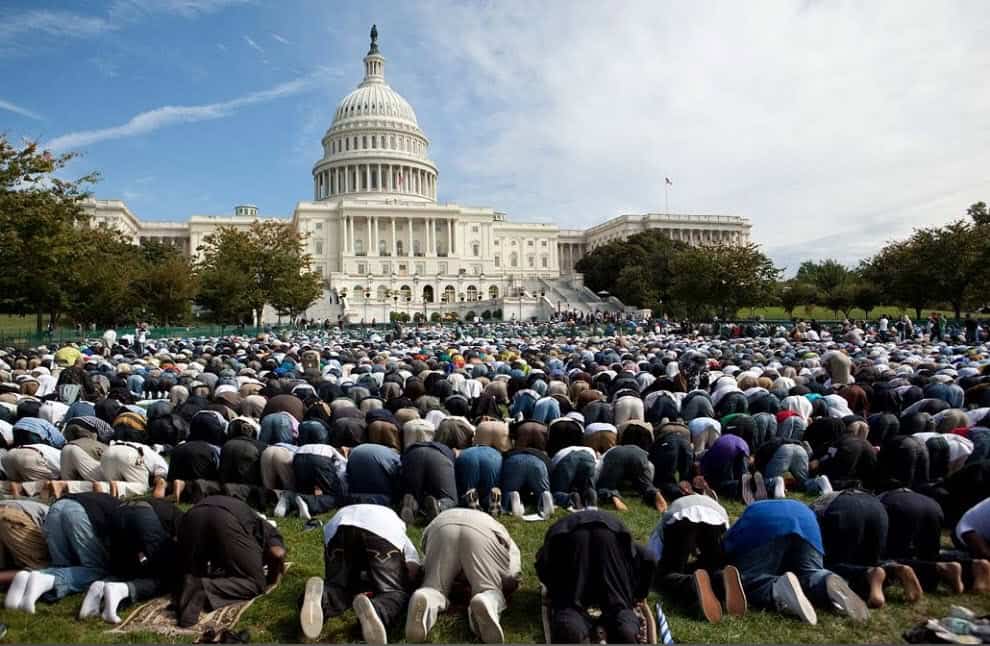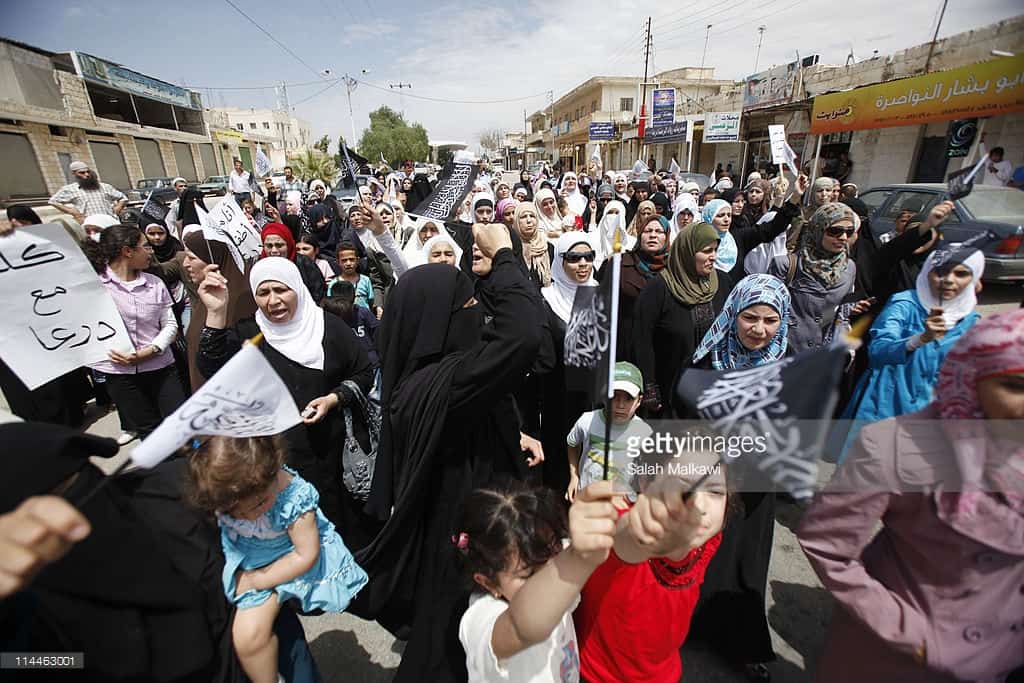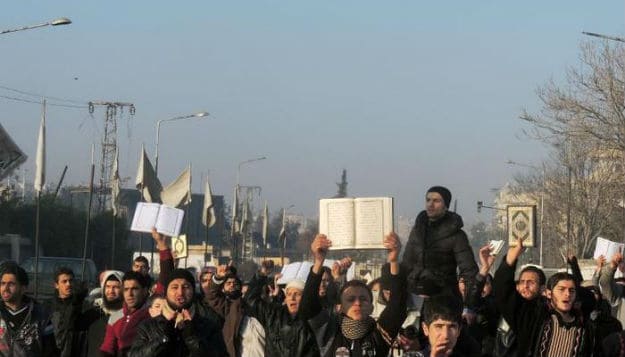It is now no secret that governments in the West are seeking to build a version of Islam specific to the places Muslims find themselves. The strategies we now see implemented have been developed over some 2 decades (if not more). In this article, we look back to one key report (and its recommendations) by the RAND Corporation in 2003 that set the groundwork for much of what was to come in the subsequent years.
Some elements of Western governments’ “intervention” in the Muslim world today are overt: the physical occupation of lands, the sponsorship of brutal tyrants, the use of drones, etc.
Other elements are not so overt, but are nevertheless of great significance, as they form the backbone of the the strategy employed by Western governments both domestically and by way of propping up pliant figures and leaderships in the Muslim world. Such covert strategies are seen as indispensible by policy makers and analysts. The problem governments now is not just the increasing ‘Islamisation’ of the Muslim world, but the more daunting dilemma on their very doorsteps as political awareness rooted in Islamic identity gathers momentum in Muslim communities living in the West.
It is important for us, as Muslims, to appreciate how governments in the West have sought to respond to this “challenge”. In this regard, a key early plank of the post-9/11 strategy to deal with Muslim communities both in the west and in Muslim countries was a report published by the RAND Corporation in 2003, the logic of which continues to prevail and which has informed many subsequent government policies throughout the West and even the Muslim world.
In this article we present a summary of the report which provided us with an appreciation of how governments intended to deal with Muslim communities locally and prop up “role models” in the Muslim world. We end by presenting ways in which we, as Muslims, should respond.
The RAND Corporation
The RAND Corporation (short for ‘Research and Development Corporation’) is a global policy think tank which was set up in 1946 initially to offer research and analysis to the United States armed forces. It has since expanded to working with other governments, private foundations, international organisations, and commercial organisations. It has approximately 1,600 employees and four principal locations: Santa Monica (California), Washington, Pittsburgh and Cambridge in the UK.
RAND was incorporated as a non-profit organisation to “further promote scientific, educational, and charitable purposes, all for the public welfare and security of the United States of America.” According to its 2005 annual report, “about one-half of RAND’s research involves national security issues.” It does a lot of classified work for defence and intelligence agencies. All unclassified reports are published on its website (www.rand.org).
This brief description, together with the fact that RAND participants across the years have included the likes of Francis Fukiyama, Henry Kissinger, Condoleezza Rice and Donald Rumsfeld, show that the RAND corporation is no insignificant player. Rather it is a serious policy advisor to the US government whose work should not be ignored.
In this study we are interested in one particular report which RAND published in 2003 entitled “Civil Democratic Islam: Partners, Resources and Strategies”. Written by Cheryl Benard, the report is indicative of the Islamic ‘threat’ weighing heavily on the minds of Western powers as they strategise on how to deal, as the report introduces, with the current Islamic world’s “struggle to determine its own nature and values” as this has, “serious implications for the future”.
All quotes below are from Benard, C., 2003, Civil Democratic Islam. Chapter 3: A Proposed strategy, which is accessible here.
The Analysis
The report is divided into three main chapters. The first chapter seeks to ‘map’ the various views, on a myriad of contemporary and classical ‘marker’ issues (such as democracy, polygamy and hijab), held by Muslims. On the basis of this mapping, chapter two places Muslims into different categories on a ‘spectrum’. Finally, chapter three proposes a strategy which it believes is needed to achieve the objectives of the US with regard to ‘political Islam’.
The spectrum arrived at broadly notes the following four categories of Muslims: fundamentalists, traditionalists, modernists and secularists. The division is made on the ground that:
“These groups hold distinctly different positions on essential issues that have become contentious in the Islamic world today, including political and individual freedom, education, the status of women, criminal justice, the legitimacy of reform and change, and attitudes toward the West.”
The ‘fundamentalists’ are described as those who are hostile to the West and to the United States in particular:
They reject democratic values and contemporary Western culture, and want an authoritarian, puritanical state that will implement their extreme view of Islamic law and morality…Their unit of reference is not the nation-state or the ethnic group, but the Muslim community, the ummah.
They are further divided into radical and scriptural fundamentalists. The former grounded in theology and with roots in religious establishment, and the latter less concerned with the literal substance of Islam and without institutional affiliation.
The ‘traditionalists’ are said to want a conservative society, being suspicious of modernity, innovation, and change. They “generally hold more moderate views, but there are significant differences between different groups of traditionalists.” These different groups are bifurcated into conservative and reformist traditionalists.
The ‘conservatives’ “believe that Islamic law and tradition ought to be rigorously and literally followed, and they see a role for the state and for the political authorities in encouraging or at least facilitating this,” and they have “grown accustomed to operating under changing political circumstances, and this has led them to concentrate their efforts on the daily life of the society, where they try to have as much influence and control as they can, even when the government is not Islamic.” On the other hand, the ‘reformists’ “think that to remain viable and attractive throughout the ages, Islam has to be prepared to make some concessions in the literal application of orthodoxy…Their posture is one of cautious adaptation to change, being flexible on the letter of the law to conserve the spirit of the law.”
The ‘modernists’ are seen as those who:
Want the Islamic world to become part of global modernity. They want to modernize and reform Islam to bring it into line with the age. They actively seek far-reaching changes to the current orthodox understanding and practice of Islam…[and] believe in the historicity of Islam, i.e., that Islam as it was practiced in the days of the Prophet reflected eternal truths as well as historical circumstances that were appropriate to that time but are no longer valid.
The ‘secularists’ “want the Islamic world to accept a division of church and state in the manner of Western industrial democracies, with religion relegated to the private sphere.” They “believe that religion should be a private matter separate from politics and the state and that the main challenge lies in preventing transgressions in either direction.”
After outlining these categories, we are cautioned that:
These positions should be thought of as representing segments on a continuum, rather than distinct categories. There are no clear boundaries between them…
The Strategy
After noting that there is no one identifiable fix to the “problem of Islamic radicalism”, the report calls for “a mixed approach” which “seeks to strengthen and foster the development of civil, democratic Islam and of modernization and development.”
Because the fundamentalists are “intent, to varying degrees, on damaging and destroying democratic modernity”, supporting them is not an option, except for “transitory tactical considerations”. As for the traditionalists, because some are close to the fundamentalists, and because “none wholeheartedly embraces modern democracy and the culture and values of modernity”, at best, only an uneasy peace can be made with them.
The modernists and secularists “are closest to the West in terms of values and policies.” Nevertheless, the secularists, “besides sometimes being unacceptable as allies on the basis of their broader ideological affiliation”, also have trouble addressing the traditional sector of a Muslim audience. Further, both the modernists and secularists are “generally in a weaker position, lacking powerful backing, financial resources, an effective infrastructure, and a public platform.”
All in all, the report advises, that:
To encourage positive change in the Islamic world toward greater democracy, modernity, and compatibility with the contemporary international world order, the United States and the West need to consider very carefully which elements, trends, and forces within Islam they intend to strengthen; what the goals and values of their various potential allies and protégés really are; and what the broader consequences of advancing their respective agendas are likely to be.
Having made the analysis and categorised the Muslims into a ‘spectrum’, chapter 3 (p.47-48) presents the overall strategy whereby these goals, in line with Western interests, are to be achieved. The proposed strategy is composed of four key elements:
- Build Up a Modernist Leadership
This is to be achieved through creating modernist role models and leaders, and including modern, mainstream Muslims in political “outreach” events. Avoiding artificially “over-Islamizing the Muslims” is advised. Instead, “accustom them to the idea that Islam can be just one part of their identity.” Further, “develop Western Islam: German Islam, U.S. Islam, etc,” by assisting in eliciting, expressing, and ‘codifying’ their views.
- Go on the Offensive against Fundamentalists
This requires delegitimizing individuals and positions ‘associated with extremist Islam’ and is to be achieved by encouraging “Arab journalists in popular media to do investigative reporting on the lives and personal habits and corruption of fundamentalist leaders.”
- Assertively Promote the Values of Western Democratic Modernity
This part of the strategy has a 3-pronged approach:
- To create and propagate a model for prosperous, moderate Islam by identifying and actively aiding countries or regions or groups with the appropriate views and publicising their successes.
- To criticise the flaws of traditionalism, by showing the causal relationship between traditionalism and underdevelopment, as well as the causal relationship between modernity, democracy, progress, and prosperity.
- To build up the stature of Sufism, by encouraging countries with strong Sufi traditions to focus on that part of their history and to include it in their school curricula.
- Focus on Education and Youth
Finally the strategy asserts that “committed adult adherents of radical Islamic movements are unlikely to be easily influenced into changing their views.” Therefore, the next generation “can conceivably be influenced if the message of democratic Islam can be inserted into school curricula and public media in the pertinent countries.” That is, focus on the youth as they are more perceptive to change.
The report does not stop here though. It goes further to propose specific strategies and actions which are needed to accomplish the overall strategy. The following is an outline:
Support the modernists and mainstream secularists first, by:
- Publishing and distributing their works;
- Encouraging them to write for mass audiences and youth;
- Introducing their views into Islamic education curriculum;
- Giving them a public platform;
- Making their opinions and judgments on fundamental questions of religious interpretation available to a mass audience, in competition with those of the fundamentalists and traditionalists;
- Positioning modernism as a “counterculture” option for disaffected Islamic youth;
- Encouraging and supporting secular civic and cultural institutions and programs.
Support the traditionalists against the fundamentalists, by:
- Publicising traditionalist criticism of fundamentalist violence and extremism;
- Encouraging disagreements and preventing alliances between traditionalists and fundamentalists;
- Encouraging cooperation between modernists and traditionalists who are closer to that end of the spectrum;
- Increasing the presence and profile of modernists in traditionalist institutions;
- Discriminating between different sectors of traditionalism;
- Encouraging the popularity and acceptance of Sufism.
Confront and oppose the fundamentalists, by:
- Challenging and exposing the inaccuracies in their views on questions of Islamic interpretation;
- Exposing their relationships with illegal groups and activities;
- Publicising the consequences of their violent acts;
- Demonstrating their inability to rule to the benefit and positive development of their communities;
- Targeting these messages especially to young people, to pious traditionalist populations, to Muslim minorities in the West, and to women;
- Encouraging journalists to investigate issues of corruption, hypocrisy, and immorality in fundamentalist and terrorist circles.
Selectively support secularists, by:
- Encouraging recognition of fundamentalism as a shared enemy;
- Discouraging secularist alliances with anti-U.S. forces on such grounds as nationalism and leftist ideology;
- Supporting the idea that religion and the state can be separate in Islam too, without endangering the faith.
Are We Surprised?
What we see from all this is an elaborate plan of action to counter the Islamic revival. The correct Islamic beliefs and concepts are being targeted whilst the false conceptions are being supported and popularised. Sincere Muslims who work for deen and the revival of Islam are labeled as ‘fundamentalists’ and ‘traditionalists’ and are maligned with lies and false propaganda spread about them.
But are we to be surprised by such elaborate strategies as those advised above by RAND?
Allah (SWT) informed us centuries ago that,
إِنَّ الَّذِينَ كَفَرُواْ يُنفِقُونَ أَمْوَالَهُمْ لِيَصُدُّواْ عَن سَبِيلِ اللّهِ فَسَيُنفِقُونَهَا…
“Verily, those who disbelieve spend their wealth to hinder (men) from the Path of Allah, and so will they continue to spend it…” (al-Anfal: 36)
Imam al-Tabari says in his tafsir of this verse:
“Those who disbelieve in Allah and His Messenger spend their wealth, giving it to their leaders from the polytheists so that they may use it in their fight against the Messenger and the believers with the aim to taking the believers away from their iman in Allah and His Messenger, and they will continue spending their wealth to that end…”
We also know that the Prophet himself underwent similar treatment at the hands of the rulers of his age. They spread lies and false propaganda about him, pushed him to compromise, pushed his followers to desert him and to renounce their newfound Islam. When all else failed they resorted to war. And so on.
Hence, it is not the first time in history that the Muslims have been targeted in this way, and the proposals outlined by the RAND Corporation are also nothing new in reality and have, in fact, been in practice for more than a century.
Our Response
What reports like this one by the RAND Corporation confirm is the reality of the Islamic revival manifesting itself with a degree of presence and permanence. Western governments have lost the ideological war and have constantly lost the battle for Muslim hearts and minds. They have also failed to win the support of the Muslims for their policies implemented in the Muslim World. To the contrary, these policies are the primary source of discontent. However, because they are not in a position to alter these policies, and given the more aware Muslim communities in the West, strategies designed to curb domestic opposition to such policies need to be drafted. These strategies are designed to ensure the development of a version of Islam which:
- Produces an alteration of the Muslim worldview, diluting it to a mere ‘spiritual’ philosophy;
- Convinces the Muslim world to reject the notion of a clash;
- Reduces Islam to the spiritual sphere alone, and places Democracy and Secularism on the pedestal as being the only ways forward for humanity. The corollary being that Islam will only take humanity backwards;
- Succeeds in convincing the Muslim world to accept the existing political status quo of nation-states, fixed borders, occupations, subservient dictators, and so on.
Nevertheless, this realisation alone is not enough. Knowing full well what is at stake in terms of the future of the Muslim world, much more is upon us. We, as Muslims, must not be satisfied with being passive onlookers or supporters. We must also work to make sure that such designs and strategies of governments come to no avail. We must reject every effort designed to create divisions within Muslim communities.
Our response, as Muslims, must be clear and unequivocal, such that we hold and decisively believe that:
- Islam is not merely a religion, but is a complete way of life that covers all aspects of life;
- There is a clash between western governments and Muslims, both abroad and locally;
- Democracy and Secularism are not neutral and are steeped in their own history and “dogma”, offering no “solution” whatsoever to Muslims;
- We reject the existing political status quo, including nation-states, fixed borders, etc and we certainly reject any relationship of subservience to the West abroad, nor as passive communities here in the West.
We must keep in mind that the ‘divide and conquer’ strategies mentioned in these sorts of report are a far cry from the differences of opinion amongst Muslims, and that we see these issues in very different lights. However, we all share certain overriding beliefs and objectives. It is these we must concentrate on by working together for them where possible, instead of working against one another to the service of the plotting and planning of government agencies and politicians.
![]()















